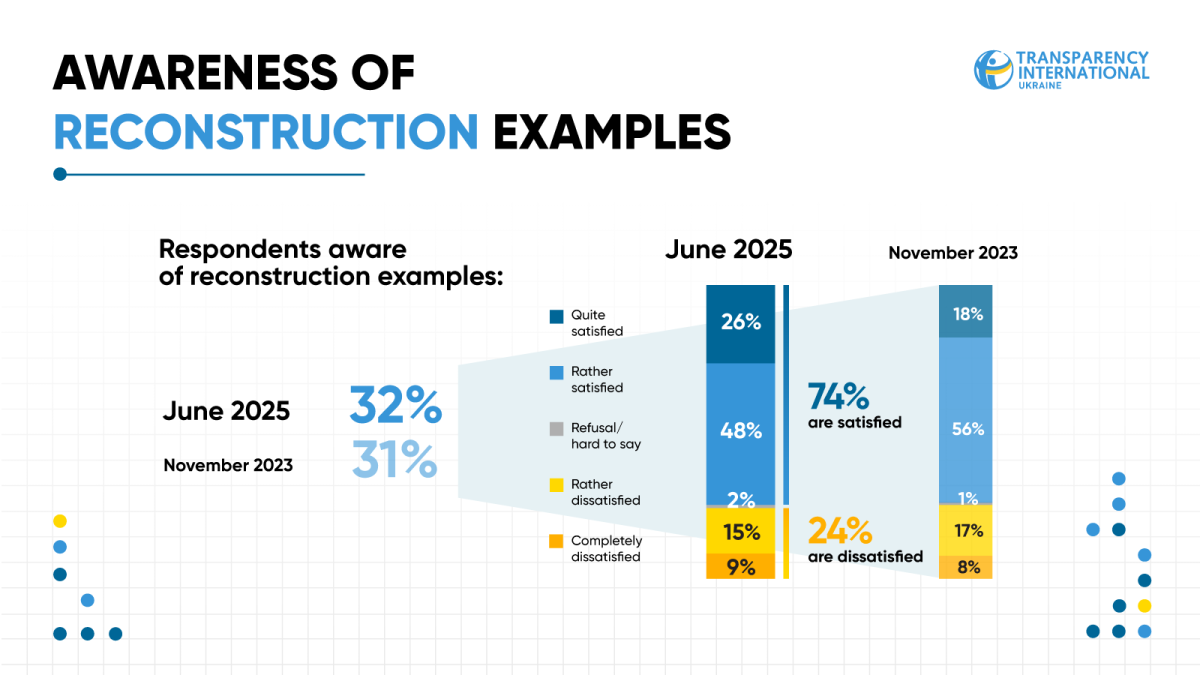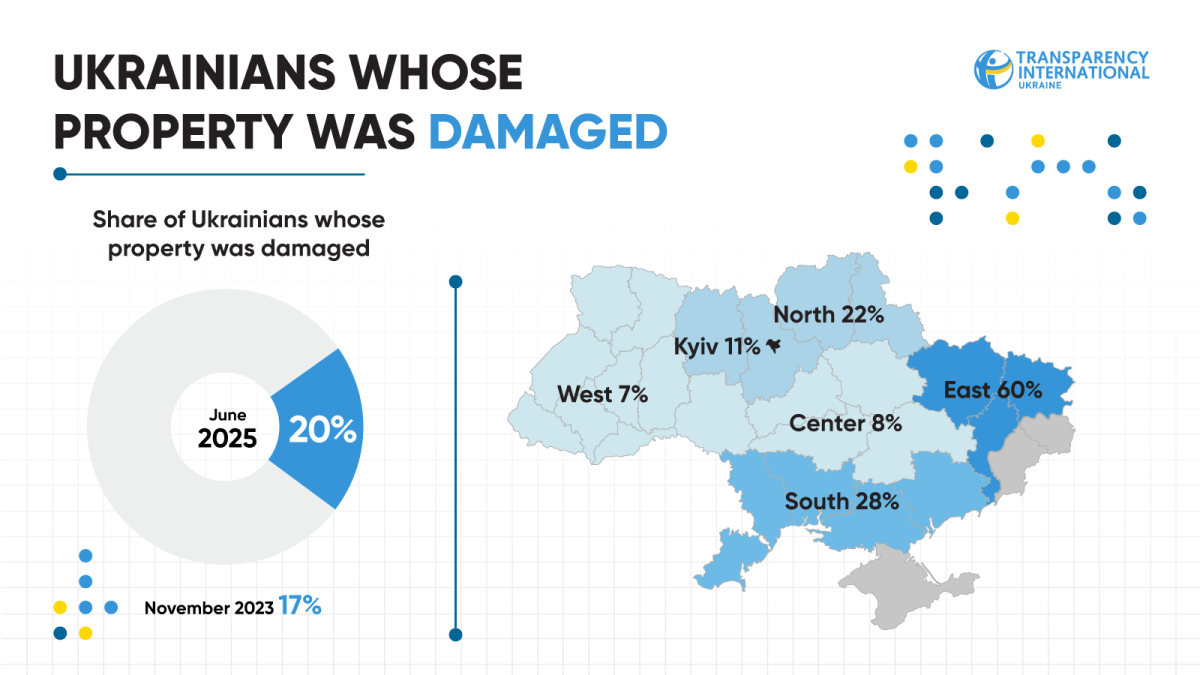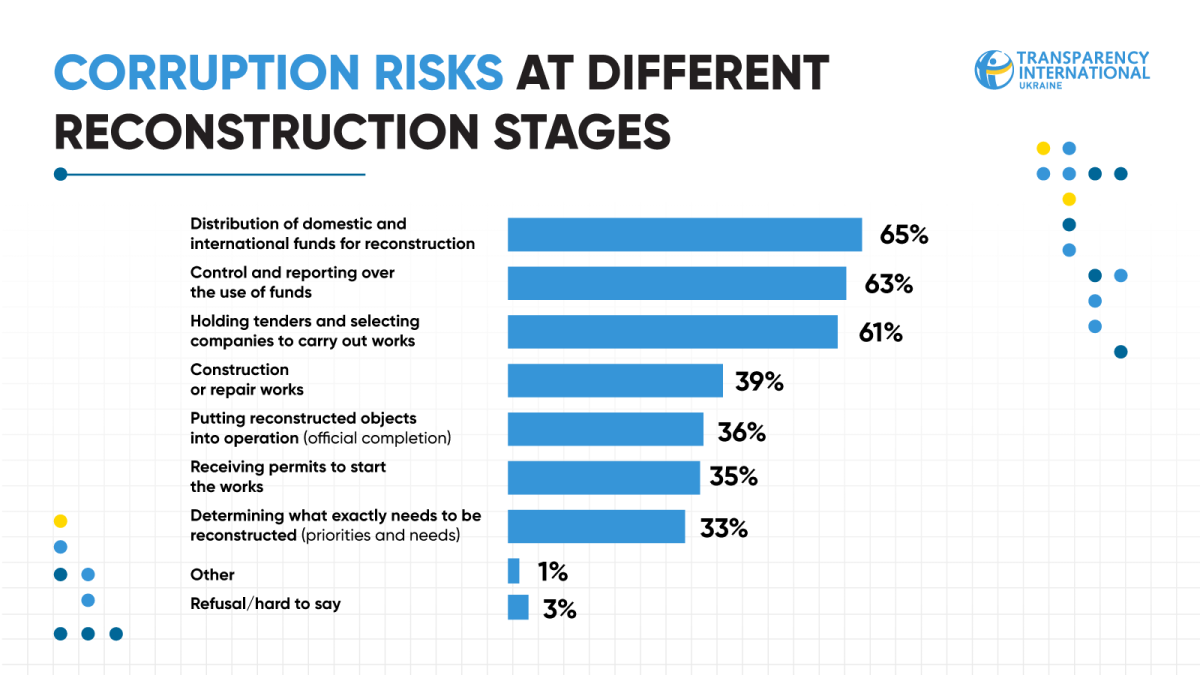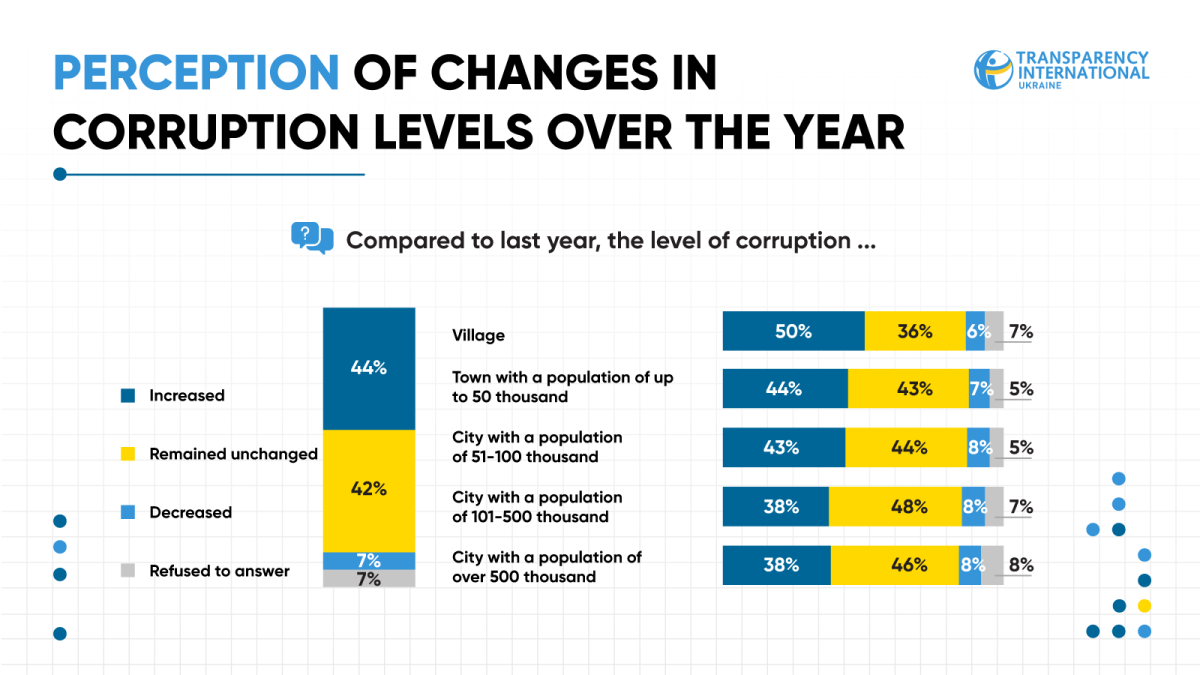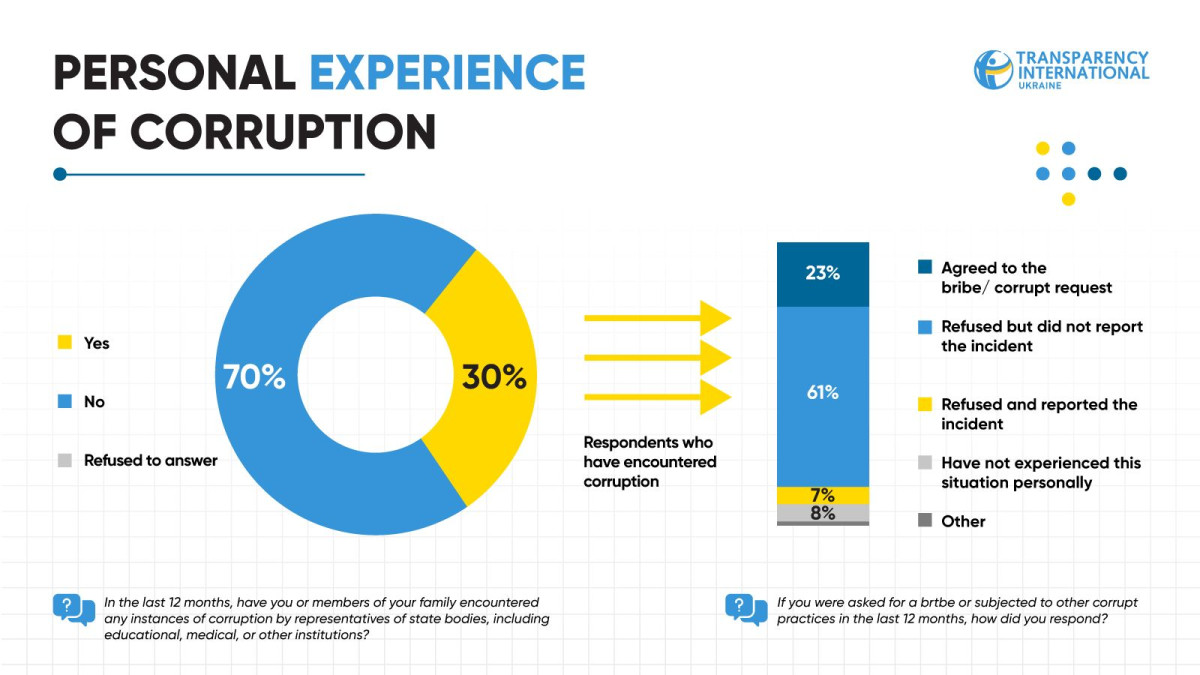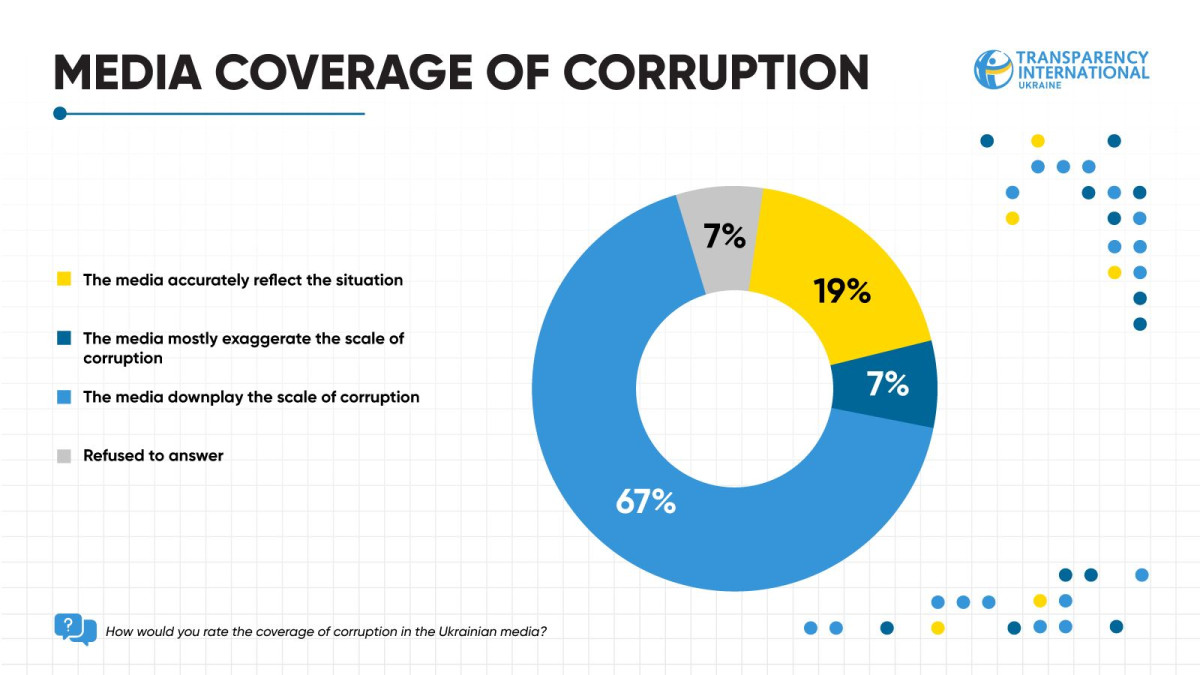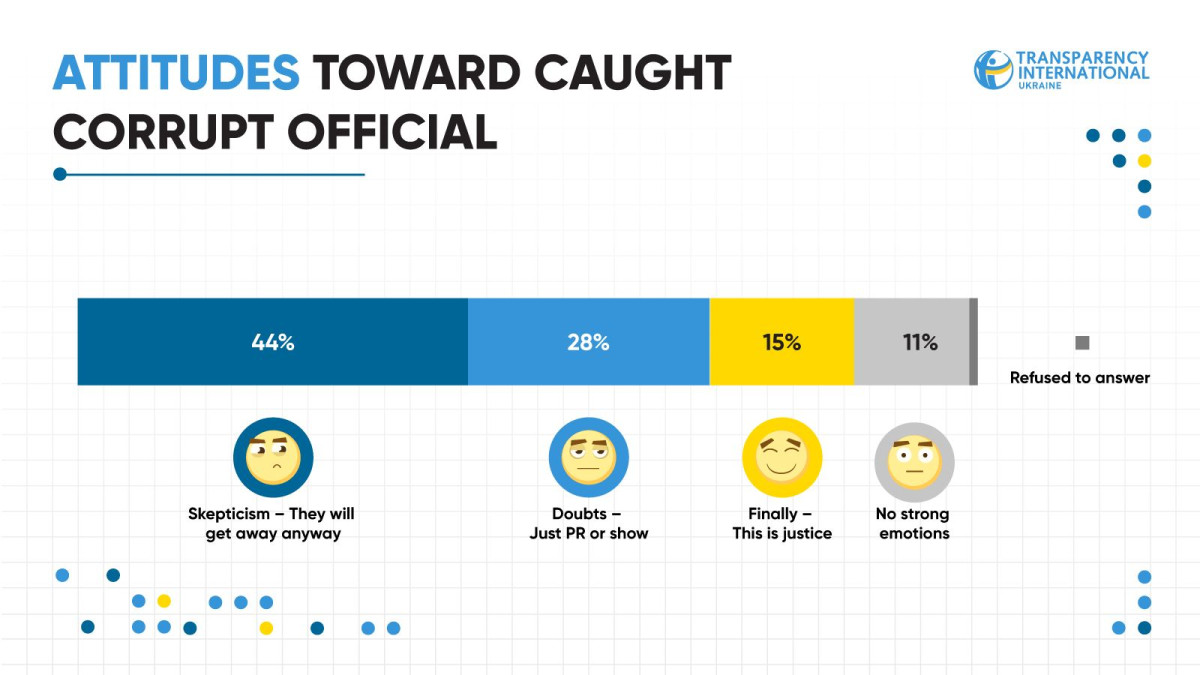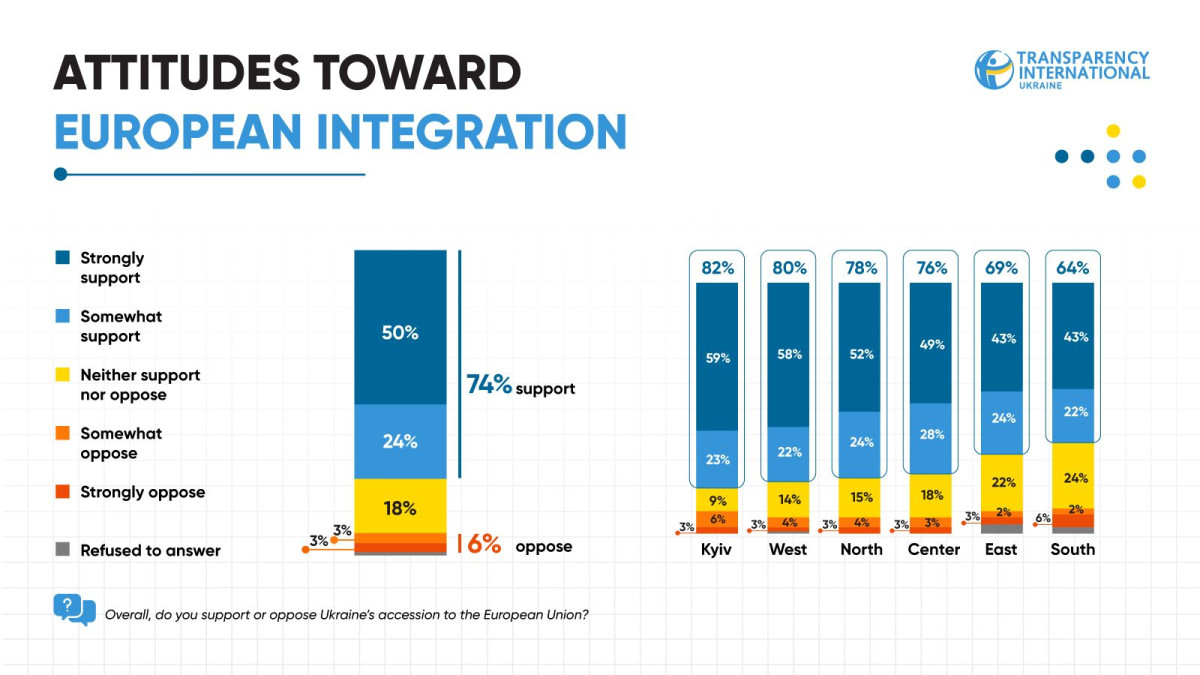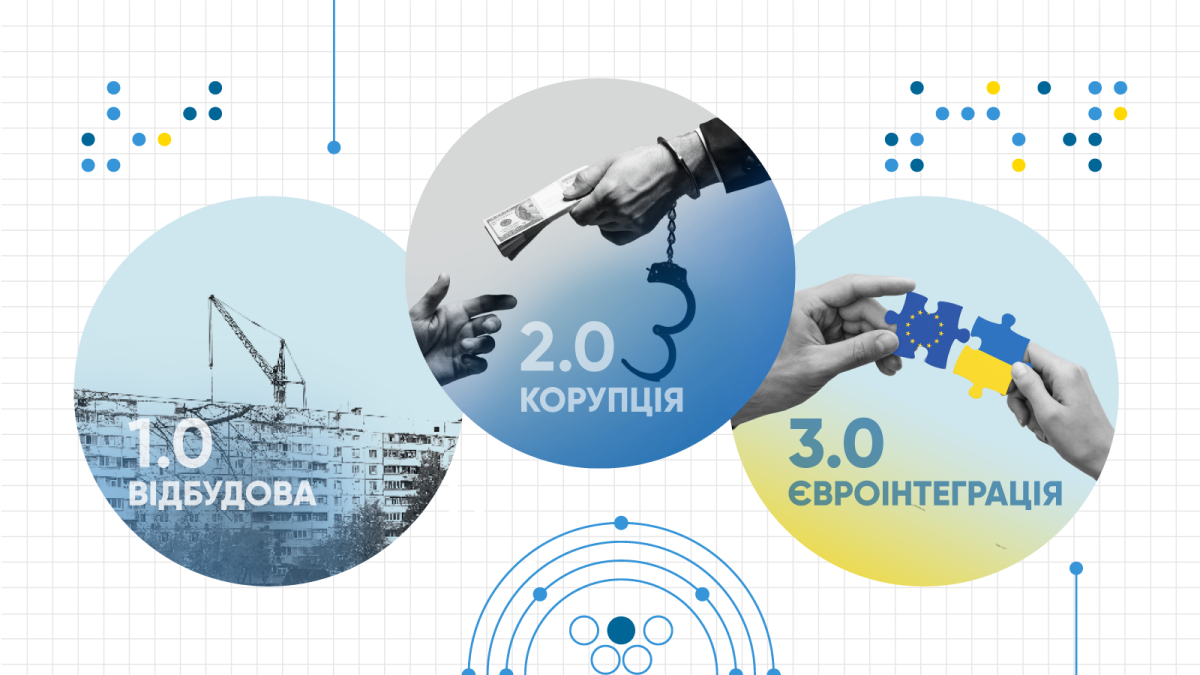

Transparency International Ukraine has presented the results of the third wave of a sociological survey conducted by the research agency Info Sapiens.
The study consists of three parts, each of which comprehensively examines Ukrainians’ perceptions of corruption, reconstruction, and European integration.
Perception of reconstruction
The current state of reconstruction satisfies 40% of Ukrainians, and more than a third have already seen the results of recovery projects. At the same time, corruption in future reconstruction remains one of the public’s greatest concerns.
According to the survey, one in three adult Ukrainians knows of or has personally seen examples of completed reconstruction. Among them, the vast majority (74%) are satisfied with the results.
The most visible reconstruction processes are in Kyiv (50% of respondents pointed to this), in the East (42%), and in the South (41%). By contrast, in the West and Center, the figures are significantly lower — 24% and 23% respectively.
When it comes to financing reconstruction, respondents believe the greatest role has been played by Ukrainian authorities: 55% say that recovery projects are implemented thanks to local self-government bodies, and 20% — thanks to central executive authorities. Ukrainians also highlight the significant contribution of the international community (40%), as well as volunteers and civil society (27%).
Every fifth Ukrainian has property damaged by the war. The highest share of affected people is in Eastern Ukraine — 60% report losses there — while the lowest is in the West, at 7%. In terms of damaged property, real estate accounts for the greatest losses, mentioned by 17% of Ukrainians.
The total value of damages is estimated by victims as follows: up to UAH 50,000 — 23%, UAH 51,000–300,000 — 19%, more than UAH 300,000 — 32%, with 10% of respondents reporting damages exceeding UAH 3 million.
Notably, compared with November 2023, the share of respondents with the smallest losses (up to UAH 100,000) has declined, while the number of Ukrainians with losses above UAH 300,000 has increased.
As in autumn 2023, most of those affected have not applied for compensation, citing the state’s more urgent wartime priorities (35%), while one in four among those who did not apply said they did not believe they would receive it. Among the 40% of affected citizens who did apply for compensation, 33% have already received it.
Sixty-five percent of respondents consider corruption in reconstruction processes to be widespread or rather widespread. The stages deemed most vulnerable to corruption by two-thirds of respondents are the distribution of international and budget funds (65%), monitoring and reporting on resource use (63%), and tendering (61%).
As in March 2023, when asked to choose between different planning horizons for reconstruction, most Ukrainians lean towards decisions promising the fastest results and focusing on reconstruction here and now.
A positive sign is the relative decline in fears and concerns about reconstruction — levels have dropped by 7 to 17 percentage points across almost all categories. The most common concerns remain lack of proper oversight (62%) and the possible return of corrupt schemes (61%). Meanwhile, 56% are worried about lack of security guarantees and renewed hostilities.
The current state of reconstruction satisfies 40% of Ukrainians, and more than a third have already seen the results of recovery projects. At the same time, corruption in future reconstruction remains one of the public’s greatest concerns.
Perception of corruption
Despite the high level of perceptions of corruption as a problem among Ukrainians, only 30% of citizens reported that they or members of their families personally encountered corrupt practices over the past year. Of these, only 23% agreed to engage in the proposed corrupt exchange, while 68% refused.
The survey underscored the relevance of the corruption issue, as the vast majority of Ukrainians perceive corruption as a widespread phenomenon — 87% of respondents. Although this perception is shared across all age cohorts, older individuals (65+) expressed the most critical assessments, with 90% identifying corruption as widespread. By contrast, among youth under 24, the share was somewhat lower — 81%.
How Ukrainians perceive the problem of corruption
As in 2023, the main challenges for Ukrainians today remain Russia’s armed aggression against Ukraine, corruption, and the destruction of infrastructure. Compared to data from two years ago, however, the salience of corruption as a problem has slightly declined — 81% now versus 88% in November 2023.
Assessments of corruption dynamics are divided: 44% of respondents believe that its level has increased, 42% consider it unchanged, and only 7% are convinced that it has decreased compared to the previous year. Reports of rising corruption were more common among rural residents (50%), while in medium-sized and large cities this proportion was lower.
A total of 89% of respondents consider political corruption to be a particularly serious problem, 81% identify business corruption as serious, and only 63% perceive petty or everyday corruption as very or somewhat serious.
At the same time, more than half of Ukrainians (51%) consider the authorities inactive in addressing corruption, and nearly three-quarters (73%) believe that it can only be overcome through systemic reforms. Notably, only 29% positively evaluate the work of anti-corruption institutions, while 38% disagree with such an assessment. Almost half of respondents (48%) regard Prozorro as an effective instrument for reducing corruption, while 27% do not share this view.
A pervasive belief in the inevitability of bribes persists: 55% agree that “nothing can be achieved without them,” and overall, respondents are more likely to reject the notion that issues in public institutions can be resolved without resorting to bribery.
Personal experience and attitudes toward corruption
Despite high levels of perceived corruption overall, only 30% of Ukrainians reported that they or their family members personally encountered corrupt practices during the past year. Among these, about a quarter complied with a corrupt demand, while 7% reported experiencing an attempted bribe solicitation.
Attitudes toward corrupt practices remain ambivalent: nearly half of Ukrainians are convinced that bribery can never be justified, while 23% report that they would always or in most cases ju
Media coverage of corruption
Two-thirds (67%) of respondents believe that the media significantly downplay the scale of corruption in Ukraine. Twenty percent consider media coverage accurate, and only 7% think the extent of corruption is exaggerated in the Ukrainian press.
tify corruption. Those who tolerate “petty corruption” most frequently justify bribes in exchange for better services in state-run medical institutions (53%) or educational institutions (35%). Remarkably, only 15% of those who tolerate corruption admitted the possibility of offering a bribe to avoid mobilization.
Most often, citizens report encountering media coverage of searches, suspicions, and detentions. Forty-one percent mentioned reports of criminal proceedings being opened, while only one in five recalled coverage of court verdicts or legislative changes. Just 13% reported seeing media materials on reforms, which are considered the key to overcoming corruption.
Overall, 72% of Ukrainians are skeptical of news about apprehended officials accused of corruption. Most respondents assume such reports reflect mere PR efforts by law enforcement agencies or that suspects will ultimately “buy their way out.” Only 15% of respondents expressed satisfaction with the delivery of justice upon reading such news.
Importantly, more than half of respondents (60%) consider the most significant indicator of effective anti-corruption efforts to be the number of officials actually punished, including imprisonment or asset confiscation. However, only 30% of Ukrainians reported hearing about cases of punished officials over the past year, and these respondents were more likely to believe in progress in combating corruption and in institutional effectiveness.
Despite the high level of perceptions of corruption as a problem among Ukrainians, only 30% of citizens reported that they or members of their families personally encountered corrupt practices over the past year. Of these, only 23% agreed to engage in the proposed corrupt exchange, while 68% refused.
Perception of European integration
The highest levels of support for European integration are demonstrated by residents of Kyiv, as well as western and northern regions. At the same time, most citizens are generally aware of both the advantages and the disadvantages of Ukraine’s accession process.
A clear majority of Ukrainians (86%) consider themselves informed about the EU accession process. Of these, 25% report being well or very well informed, while another 61% indicate a certain level of knowledge of the issue.
As a result, 74% of citizens support Ukraine’s accession to the European Union. The strongest support is observed among residents of Kyiv (82%), the western (80%), northern (78%), and central (76%) regions. By contrast, support levels are somewhat lower in the south (69%) and east (64%). Currently, 6% of Ukrainians oppose EU accession, while 18% remain undecided.
The most frequently cited expectations from EU membership are a better future for children (65%), peace (60%), economic growth (60%), improved living standards and quality of life (59%), and greater employment opportunities (58%). Also, 55% of respondents believe that integration with the EU will help combat corruption in Ukraine, while 54% are convinced that EU membership will foster adherence to the rule of law. Only 2% of Ukrainians see no benefits at all from European integration.
Among the main concerns regarding EU accession, respondents cited outflow of young people (48%), exploitation of natural resources (35%), immigration (31%), and increased bureaucracy (30%). Notably, 30% of respondents still identify potential deterioration of relations with Russia as a negative consequence of Ukraine’s integration into the EU, while 11% believe that the EU itself has no future. Overall, however, respondents associate EU membership with more advantages than disadvantages — 8% report seeing no disadvantages at all.
Forty-two percent of respondents remain optimistic about Ukraine’s accession prospects, believing the process will take up to five years. Nearly one-quarter (22%) estimate the timeline at between 6 and 10 years, while 12% are convinced that Ukraine will never obtain EU membership.
The survey was conducted by the research agency Info Sapiens on behalf of Transparency International Ukraine in June–July 2025. The sample included 1,015 respondents, representative by gender, age, locality type and size, and macro-region across government-controlled territories of Ukraine. Data collection method: telephone interviews (CATI).
This is already the third wave of the survey: Transparency International Ukraine previously presented results in June and December 2023.
This publication was prepared by Transparency International Ukraine with the financial support of Sweden.
The highest levels of support for European integration are demonstrated by residents of Kyiv, as well as western and northern regions. At the same time, most citizens are generally aware of both the advantages and the disadvantages of Ukraine’s accession process.




